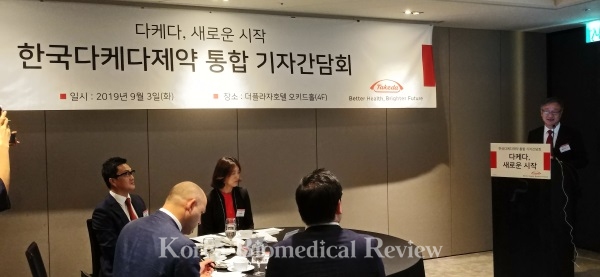Takeda Pharmaceutical Korea on Tuesday held the first news conference after the merger with Shire Korea, announcing a new start and business plans.
The Korean offshoot of the Japanese pharmaceutical company said at the Plaza Seoul that it would roll out 16 new medicines for cancer, gastrointestinal diseases, nervous system diseases, rare diseases, and plasma-derived therapies by 2023.
Takeda Pharmaceutical Korea CEO Moon Hee-seok presented the new vision of Takeda, “a company committed to the treatment of patients around the world.”

“Takeda Pharmaceutical has emerged as a leading global biopharmaceutical company through innovations that focus on value and R&D t in the rapidly changing healthcare market,” Moon said. “Standing on a new start line, Takeda Pharmaceutical Korea will strive towards ‘Better Health and a Brighter Future’ for patients through leading innovation in medicine.”
Moon also presented the company’s business plans.
Through the recent merger with Shire, Takeda was able to attain Shire's rare disease pipeline, including treatments for hemophilia, hereditary lysosomal storage disease, and hereditary angioedema, building a stronger product portfolio, he said.
The Korean unit will follow Takeda’s strategies focusing on six key treatment areas – anticancer drugs, gastrointestinal diseases, nervous system diseases, rare diseases, plasma-derived therapies, and vaccines -- he added.
“Except for the vaccine area where we don’t have any visible product, we have more than 20 pipelines in phase 2 and 3 trials in the five key areas,” Moon said. “Takeda Korea plans to release 16 products for cancer, gastrointestinal diseases, and rare diseases, including an additional indication of existing drugs.”
He chose ovarian cancer treatment Zejula (ingredient: niraparib) as one of the representative products. Zejula won the local license as single maintenance therapy for adults with platinum-sensitive recurrent high grade serous ovarian cancer (including fallopian tube cancer or primary peritoneal cancer). Unlike existing poly ADP-ribose polymerase (PARP) inhibitors, Zejula can be used regardless of BRCA -- breast cancer gene 1, 2 -- mutation.
Takeda Korea was pushing to get Zejula’s insurance benefit and release it in the market within the year, Moon said.
The company also obtained approval for Gattex (teduglutide) for the treatment of short bowel syndrome in Korea last year, and expected to earn reimbursement in 2020, he added.
On the outside, Takeda Korea will continue to expand the growth of globally leading products and improve treatment access by accelerating the introduction of new pipelines. On the inside, the company was making efforts to create a new corporate culture in the wake of the merger of the two firms, Moon noted. He vowed to nurture talents from both of the two companies so that they can all grow together.
“Through the merger, Takeda has obtained a stronger growth engine for the future. We will do our best to grow as a globally leading biopharmaceutical firm that receives trust from patients and the community,” CEO Moon said.

